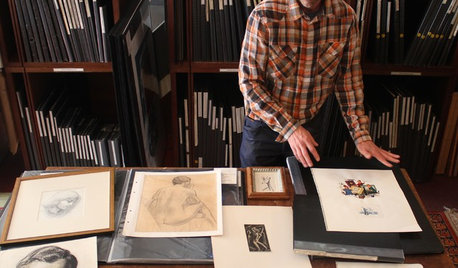The lost art of penmanship
Lindsey_CA
8 years ago
Featured Answer
Sort by:Oldest
Comments (65)
gyr_falcon
8 years agolast modified: 8 years agoFun2BHere
8 years agoRelated Discussions
Lost Art
Comments (18)Dave - your comment leads to another thought. When I'm reviewing recipes that I want to try or recipes of my own that I want to modify, it really helps to understand the underlying theory of what you are trying to accomplish here. So for example, if my homemade soup calls for pasta or rice, I can either omit it, substitute potatoes, or substitute rehydrated and cooked beans. I leave out flour and fats. Tomato sauces can be modified in a number of ways, but once it gets past plain tomato sauce with citric acid or lemon juice, it needs to be pressure canned for whatever ingredient takes the longest to preserve safely (such as if I am using ground beef to make spaghetti sauce). I keep that in mind when I am reading recipes to try on the Internet. I try to evaluate whether there is anything in here that is not a safe practice, is it acidic enough for BWB, are there any no-no's for pressure canning. I also recheck the times for processing. Recently, I read with interest of canning mandarin oranges. The author got the recipe from UGA's "So Easy to Preserve". When I rechecked on canning oranges in my Ball book, everything was correct including the syrup and processing times. Even for Ball, I recheck against other recipes to make sure it all makes sense before I start....See MoreHas hand quilting become a lost art????
Comments (28)"The Statler Stitcher® is a computer software program combined with hardware which will operate a longarm quilting machine and can stitch almost any design. A Gammill® machine equipped with Statler Stitcher® can handle an intricately patterned king-size quilt in a matter of hours instead of days, and is guided by the computer instead of by hand. The system can determine the pattern size, block size, stitches per inch, repetitions of the pattern and the offset of the pattern." If you have $30,000 to spare and room in your basement, you can have your very own quilt factory, and the glory will be a production run of one single factory quilt at a time. It will be perfectly easy to save your program and throw on quilt after whole cloth quilt--they will all turn out perfectly, and perfectly the same, at the great rate of two per day. It's an amazing machine--the "quilter" doesn't even have to stay in the room. Most factories call this person an operator. You may say you'd never churn out copies--but you COULD. Back to my painting analogy--is it original hand work, or is it limited edition print signed by the artist, or is it a paint by numbers kit? Folk art follows a tradition in a craft. Generally, folk art can be done by...folks. Whatever is happening by professional long arm quilters with these expensive machines is VERY far from the heart and soul of a quilting tradition. My grandmother and great aunt were skilled factory workers at the Derby--now known as Fruit of the Loom. You can take the machine out of the factory but you can't take the factory out of the machine. They'd no more be proud of a machine quilt than of a pair underwear they bought at Wal-Mart. My mom sends out machine pieced quilts to be long armed--it's expedient, but she'd never call it the best. The fact is, by law of supply and demand, with automatic machines churning out two quilts a day, those quilts will be less valued over the course of the years. People are smart, and all the art talk in the world doesn't change the value of reproducible work done in a few hours by automatic machine. The human element becomes entirely secondary to the machine. Some of these shows function mostly as a marketing tool for the industry, and indeed the whole shift to machine quilting was pushed along by big prizes awarded by businesses. It's very much in the interest of business to elevate the easiest. The easiest sells. BTW, lets all make a million pillowcases!!! Excuse me? This, I think, is what kills machine quilting for me, and makes me reject it as art (not high art, not fine art, but folk art.) The end product of Gammill Statler Stitcher will be indistinguishable from any other machine quilt--except it will look very, very skilled and be entirely reproducible. I feel like my values have been slowly pushed too far, my standards slowly pulled aside and I feel myself backlashing. Suddenly, I look up and say "That's ridiculous." I certainly don't mean to attack machine quilters, especially you, Annie. What you do is practically unique--find me another professional treadle quilter (yeah, I know there might be a few, but still, it's rare isn't it?) It's not black and white by any means, machine quilting has it's place, albeit with all these different categories and qualifiers. Hand quilted will always be a class alone for me, no explanations required because everybody understands a hand, a needle, and a thread....See MoreLost Art???
Comments (3)Hi Sycorreale, Welcome to the painting forum. Like all things,the popularity of painting seems to go in cycles. The 80's, 90's and early 2000 really were exciting times for those of us who enjoy painting. There were lots of little shops selling books and supplies and where you could take classes. Most of those are gone now, the ones that remain are usually Multi-craft type stores and the big guys like Michael's, Joanne's, Hobby Lobby, etc. However, there is still the Society of Decorative Painters and several online places where you can buy books and wood. In fact there are some posts on this forum that list places online where you can buy books and even a post of places where you can find free patterns too. I wish we had a way to keep those posts at the top of the page, but am told there's not. You might just try the search box to find them. If that doesn't work, come back and tell me and I'll find them and bump them back to the top of the main page for you. As for the styles you mentioned, they sort of went hand in hand with the Country and Primitive style decorating that was popular at that time. Primitive, Realistic, Shabby Chic, are all still pretty popular. Luvs...See MoreWhat's hidden in your sink base? A mess or state of art work?
Comments (21)I don't have a functioning camera right now to make an electronic photo file, but will remark that it is easiest inside a nice cabinet to use combinations of pex tubing and push to connect fittings such as Sharkbite brand (among many others) to avoid sweat soldering damage. All that is needed is a means to cut the pex to a clean flat end. Mistakes are easily remedied by using a different size piece of pex. Adapters exist to go from the pex to the fitting that dangling faucet hoses use. 3/8 poly line along with John Guest type push to connect fittings will be good for RO lines or such. Pex and poly are at their limit when used for pressurized water at boiling temperatures, so the hot water source in the house needs to be under some form of temperature control. A boiler type of water heater with potential for overshoot to 220 or so would be a risk in my view without a working moderator (required anyway by code). Some water chemistries tend to degrade the modulator so that needs to be kept in mind. My primary sink cabinet base includes garbage disposal and DWV plumbing, stand pipe for dishwasher hose, hot/cold feed for main faucet and to moderating valve for dishwasher (gets mix of hot and cold). Also there is the touch faucet control box, the fiber-optic garbage disposal control box, and quad electrical outlet. RO connection to both hot and cold sides of a pull-down faucet are present. All of the plumbing is mounted on stand-offs on the back or side walls of the cabinet base. kas...See MoreKate Gladstone
8 years agomatthias_lang
8 years agograinlady_ks
8 years agorob333 (zone 7b)
8 years agolast modified: 8 years agoAdella Bedella
8 years agoElmer J Fudd
8 years agorob333 (zone 7b)
8 years agolast modified: 8 years agoplllog
8 years agoLindsey_CA
8 years agowildchild2x2
8 years agolast modified: 8 years agoTexas_Gem
8 years agoLindsey_CA
8 years agorob333 (zone 7b)
8 years agoplllog
8 years agoLindsey_CA
8 years agoElmer J Fudd
8 years agolast modified: 8 years agocolleenoz
8 years agolast modified: 8 years agoplllog
8 years agolast modified: 8 years agorob333 (zone 7b)
8 years agoarkansas girl
8 years agolast modified: 8 years agoplllog
8 years agobossyvossy
8 years agoElmer J Fudd
8 years agolast modified: 8 years agoKate Gladstone
8 years agoKate Gladstone
8 years agoplllog
8 years agomare_wbpa
8 years agoTexas_Gem
8 years agowildchild2x2
8 years agoginny20
8 years agoplllog
8 years agoartemis_ma
8 years agoartemis_ma
8 years agolast modified: 8 years agomare_wbpa
8 years agolast modified: 8 years agoplllog
8 years ago
Related Stories

FEEL-GOOD HOMEThe (Lost) Art of Laziness
Do you go to bed with to-do lists flashing through your head? Try one of these ideas to give yourself a break
Full Story
LIFESimple Pleasures: Put Pen to Paper
Note writing a lost art? Not when you have a nice selection of papers, a dedicated spot and the right frame of mind
Full Story
ROOTS OF STYLEArt Deco, Art Nouveau, Arts and Crafts: What’s the Difference?
If the zigzag and swirly designs of the past leave your head spinning, these descriptions will straighten you right out
Full Story
ART10 Simple Ways to Display and Enjoy Printed Photos
Are your photos lost in limbo on your electronic devices? Bring them out into the open with these viewing-friendly ideas
Full Story
LIFEEasy Green: Modern Homesteaders Stake a Claim
With more options for raising chickens, growing edibles and keeping bees than ever, suburban and city folk are rediscovering a lost art
Full Story
STUDIOS AND WORKSHOPSA Creative Studio Welcomes Family Projects
Spilled paint won’t cause lost tempers in this 450-square-foot addition made for art, music and learning
Full Story
PRODUCT PICKSGuest Picks: Letter Writing in Modern Style
Resurrect the lost art of letter writing with unmistakably current desk accessories, stationery and pens
Full Story
ARTLet's Put a Price on Art: Your Guide to Art Costs and Buying
We paint you a picture of what affects an artwork's price — plus a little-known way to take home what you love when it's beyond your budget
Full Story
WALL TREATMENTSThe Best Chalkboard Wall Art on Houzz
Who knew Houzzers could be so artistic with a little chalk? We did
Full Story
ARTThe Best Ways to Care for, Clean and Store Art
Keep your treasures on canvas and paper in top shape with this expert advice from two gallery directors
Full StorySponsored
Columbus Area's Luxury Design Build Firm | 17x Best of Houzz Winner!




cynic